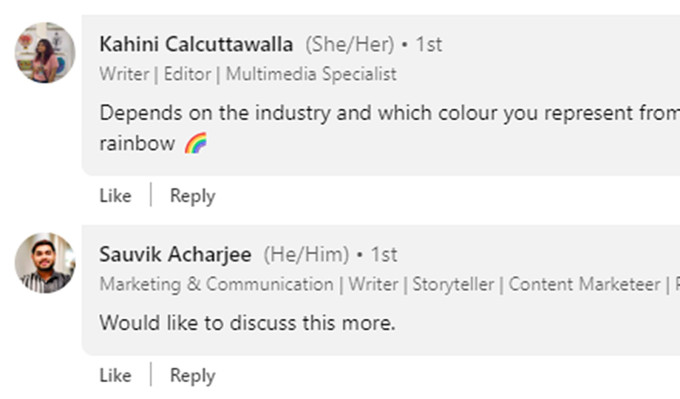Pride and prejudice: Has anything changed for queer people working in corporate India?
Sauvik Acharjee has been paid less than his cis-gendered, heterosexual coworkers, despite having more experience. He has been called a string of slurs by his senior colleagues in a client meeting. He has, multiple times — if not often — been judged based on his sexuality, rather than his work.
Yet, the 33-year-old writer & marketer, emphasised things have changed. Though, on being asked to what extent, he couldn’t say.
 https://images.indianexpress.com/2020/08/1x1.png
https://images.indianexpress.com/2020/08/1x1.png
She/her. He/they. He/him. They/them. Finding one’s pronouns on their LinkedIn profile and email signature is becoming much more commonplace than it was a few years ago. And it’s not just the employees who are changing, the job descriptions of various Indian employers now find a mention of them being “equal opportunity”. This translates into an employer’s commitment towards fair, unbiased treatment in the workplace, irrespective of one’s sexual orientation, gender identity, race, religion, caste, creed, etc.
 A screenshot from LinkedIn
A screenshot from LinkedIn
These changes often intensify around the time of June. Pride month, as it is known, honours LGBTQIA+ culture and experiences, and often sees companies adorning their logos in rainbow hues (mirroring the Pride flag) and launching initiatives aimed at the community. But has this meant ground-level change or only surface-level peacocking?
“Ten years ago, very few transgender community individuals were working in the corporate sector. Today, many are employed across both government and private sectors,” says Anjana Berkmans, a talent acquisition consultant at Philips India. The 32-year-old revealed how she struggled before coming out as trans and was “bullied, discriminated against for my mannerisms.” However, the landscape has changed, and companies are now visibly encouraging diversity,” she noted.
The 2018 reading down of Section 377 of the Indian Penal Code, which criminalised homosexuality, marked a turning point. It opened doors for legal protections and paved the way for more progressive policies within companies. Legal protection provides a baseline of security for LGBTQIA+ individuals in the workplace, according to Sonica Aron, founder at HR advisory firm Marching Sheep.
 Members of Humsafar trust for LGBT community celebrates at their office in Santacruz after the historic verdict on section 377 (Express archive phot0)
Members of Humsafar trust for LGBT community celebrates at their office in Santacruz after the historic verdict on section 377 (Express archive phot0)
Nikhil Gawade, HR business partner at Philips India, who also identifies as queer, agreed. “Today, I feel more comfortable sharing my identity with colleagues, leaders and across organisations knowing that there are policies in place to protect me, especially in my current organisation.” But this is not always true, he said as “there is always a fear of discrimination,” adding, “even at job interviews, where I wanted to be open, it was made clear that my LGBTQIA+ identity might be a problem as the organisation is still not accepting of it.”
 Nithin Raj started working in an MNC in 2014. “Back then, DEI (diversity, equity & inclusion) wasn’t even a thing,” the 30-year-old internal audit specialist, he/they, tells us. However, according to him, these changes are not uniform across corporates. He experienced it first-hand when he moved to a small organisation in a Tier-2 city. “Even if no one tried to bully me, like in school or college, there were constant ‘jokes’ and degrading comments about the queer and trans community,” Raj said.
Nithin Raj started working in an MNC in 2014. “Back then, DEI (diversity, equity & inclusion) wasn’t even a thing,” the 30-year-old internal audit specialist, he/they, tells us. However, according to him, these changes are not uniform across corporates. He experienced it first-hand when he moved to a small organisation in a Tier-2 city. “Even if no one tried to bully me, like in school or college, there were constant ‘jokes’ and degrading comments about the queer and trans community,” Raj said.
Though legal changes are welcome, according to Debolina Dutta, professor of practice – organisational behaviour & HRM, IIM Bangalore, they are often limited, and do not translate into immediate societal or attitudinal changes. Social spaces in India often fail to provide an inclusive environment for LGBTQIA+ individuals, including in workspaces, she noted, adding that India’s cis-hetero normative culture is reflected in workplace policies and informal practices.
“Once July 1 hits, nothing stays as it is on June 1,” said model and artist Hemanth Bhargav. “Why do people ask these question only during June? Is it because of the celebratory moods of Pride Month, or are you just proving to the world that you are open to asking this question?,” the 30-year-old queer artist questioned.
Policies are a great first step, but true inclusivity requires a cultural shift. Homophobia or transphobic jokes, while explicitly against policy, do exist and create a hostile work environment, said Aron. These micro-aggressions are visible even at a managerial level like the ride-sharing company, Ola, CEO’s.
“Most of us in India have no clue about politics of this pronouns illness. People do it because it’s become expected in our corporate culture, especially MNCs. Better to send this illness back where it came from. Our culture has always had respect for all. No need for new pronouns,” Ola CEO Bhavish Aggarwal wrote on LinkedIn in early May, when Google’s AI referred to him as they. His post has since been taken down by the microblogging site, deeming it “unsafe.”
Dear @LinkedIn this post of mine was about YOUR AI imposing a political ideology on Indian users that’s unsafe, sinister.
Rich of you to call my post unsafe! This is exactly why we need to build own tech and AI in India. Else we’ll just be pawns in others political objectives. pic.twitter.com/ZWqiM90eT1
— Bhavish Aggarwal (@bhash) May 9, 2024
According to Deloitte’s 2023 LGBT+ inclusion survey, in 2023, 70 per cent of queer employees in India experienced non-inclusive behaviours, compared to a global average of 42 per cent. It also found that though being out at work is important for many, less than half are out with all colleagues, and mainly concerns about being treated differently keep many from being out at work.
For 30-year-old Kahini Iyer, revealing her identity is a matter of choice. “On one hand, it’s a privilege to be able to hide your identity that not every queer person has. On the other, I think, lesbian and gay is about as far as most people’s understanding goes,” the writer and editor, who identifies as bisexual, said.
All Nithin, Hemanth and Sauvik agreed, adding that companies seem to listen to “cis-passing queer folks” more. “To me, true inclusion is far and the company efforts seem aimed at optics rather than social justice,” said Nithin.
A 2022 study by HR firm Randstad India also paints a concerning picture of LGBTQIA+ inclusion in Indian workplaces. 53 per cent of the companies surveyed don’t offer career development programs for LGBTQIA+ employees, they noted, and only a small fraction (9.5 per cent) of the organisations are making significant efforts to be inclusive. The study suggests a lack of LGBTQIA+ representation in senior positions, with most conscious hiring happening at junior (33 per cent) and middle levels (31 per cent).
View this post on Instagram
A post shared by JZD (@shopjzd)
What are the changes queer India wants to see corporates making?
For real progress, a deeper commitment to LGBTQIA+ inclusion is needed within Indian workplaces. Here’s how corporations can move beyond mere symbolism and create genuine opportunities, based on the advice we received from HR experts and employees from within the queer community:
1. Dismantle the glass ceiling: True inclusion means actively seeking diverse talent across all levels, from housekeeping to leadership. Focus on skills and qualifications, not just a candidate’s sexual orientation or gender identity.
2. Foster visibility: Companies need to create welcoming environments by providing inclusive washrooms, implementing trans-friendly dress codes, and offering unconscious bias training specifically focused on trans identities. Encourage pronoun introductions and support LGBTQIA+ employee resource groups. Celebrate diversity through public events that showcase the company’s commitment to inclusion.
 Encourage pronoun introductions and support LGBTQ+ employee resource groups (A screenshot from LinkedIn)
Encourage pronoun introductions and support LGBTQ+ employee resource groups (A screenshot from LinkedIn)
3. Policies with pride: Current policies often fall short. Establish gender-inclusive sexual harassment policies with clear reporting mechanisms. Include queer individuals in harassment committees to ensure a diverse and representative approach to addressing issues.
4. Benefits for all: Many companies offer health insurance that excludes same-sex partners and families. Update benefit policies to ensure equal coverage for all employees, regardless of sexual orientation or gender identity.
5. Sensitisation beyond pride: Move beyond performative Pride Month events. Invest in comprehensive sensitisation programmes throughout the year, empowering both managers and employees. These programmes should address unconscious biases and create a more informed and respectful work environment.
6. Champion education and awareness: Invest in ongoing training for all levels. This empowers employees to report discrimination and creates a safe space for open communication.
7. Listen, Learn, and Adapt: Conduct regular surveys and hold open discussions with LGBTQIA+ employees. This feedback loop allows you to continuously improve and address any shortcomings in your inclusivity initiatives.
By prioritising these steps and actively listening to the LGBTQIA+ community, companies can move beyond rainbow washing and create a workplace where everyone feels valued, respected, and empowered to reach their full potential.
Disclaimer: The copyright of this article belongs to the original author. Reposting this article is solely for the purpose of information dissemination and does not constitute any investment advice. If there is any infringement, please contact us immediately. We will make corrections or deletions as necessary. Thank you.
